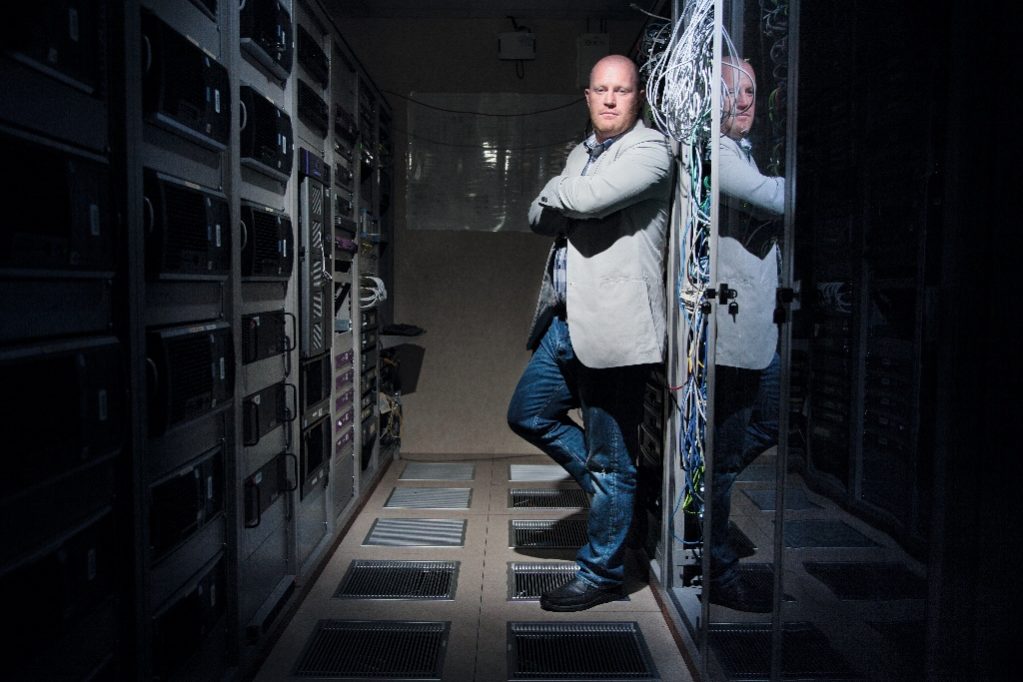A few years ago, it was assumed that fiber optic cabling would eclipse copper cabling in Africa. It hasn’t quite happened yet, but fiber optics has a warm place in the sun. Dave McGeehan, an Irishman, is taking advantage of this.
McGeehan and his wife, Sandra, took a huge risk. They both quit their well-paying jobs and started their own company, Apache Optics. They had to borrow around $10,000 from a friend to buy their first stock.
“We had no money. We were not in a good financial state to start a business,” says McGeehan.
“People think we’re great businessmen. I back the horses, I take a punt on the football. We take risks. You’ve got to be a little bit of a maverick.”
Apache Optics sells optical transceivers. These are needed to send and transmit information such as data and emails. They are also used for the internet and storing documents.
Large technology companies require unique firmware to operate in their systems. Apache Optics offers systems for all.
The company’s greatest advantage – its cheapness. It has raised the ire of the big multinationals.
“If they could close us down tomorrow, they would,” says McGeehan.
“We’ve never had any direct contact with them, but I’m sure they would like to close down our industry as a whole.”
McGeehan encourages clients to just order the boxes from the big players and the components from him. A lot of people appear reluctant to do so.
“It’s out of fear. They insist they’ll nullify your warranty. They’ll say it verbally but they don’t actually have a legal foot to stand on.”
“It was initially a very hard sell. Companies depend on these systems to deliver their service. The fear of God is put into them by these firms saying ‘you have to use our products or the system won’t work.’”
McGeehan says he is slowly winning the battle in South Africa, Botswana, Namibia, Zimbabwe, Zambia, Mozambique, Nigeria, Cameroon, Ghana, Kenya and Uganda.
With the increased importance of telecommunication and data in business, fiber optic cables are becoming more and more popular. Fiber is faster, cheaper and more stable than copper wires. Africa, however, has been slow to catch on.
“In a lot of African countries, telecommunications and copper is controlled by the government because of the huge revenue involved in it,” says McGeehan.
“The fiber networks in Europe are so much bigger because the governments there invested in it. That is why you can access Twitter, Facebook, YouTube while you’re on a train or a bus. You need government investment in fiber.”
Although there is a lot of fiber available in Africa, it is not very cheap as most of it is built by private money. McGeehan expects mobile phone companies to grow the industry.
“Cellphones and tablets are a big driver in our business and technology because of the direct fiber links. We were projected to do R4.2 million ($394,000) in the first year of business in 2013, we did R6.8 million ($638,000). This year we forecast R8 million ($750,000), but we’re already at R5 million ($470,000) and we’re only halfway through the year. So the growth is there.”
McGeehan has come a long way since he arrived on African soil in 1996. He left Ireland for adventure. He was offered a chance to play and coach cricket for six months. During his first year he was offered around $100 a month and a scooter to get around on. He spent half the year in Ireland and the other half in South Africa for four years. While in Johannesburg, he met Sandra, a student at the time, at a braai organized for the cricket players. She had to work 10 shifts a week so the couple could pay their bills.
“She was always a hard worker, so I knew then she was the girl for me.”
In 2000, they married, moved to Ireland and had two sons. They missed the great outdoors and moved back.
Sandra developed codes that were used in fiber optics for the couple’s former employers. The company, EPS Global, stopped developing the codes because they viewed it as controversial since they had to buy parts from the larger companies that would then become the competition. With the shift in the business, the couple decided it was time to do things their own way. Sandra had worked in the industry and they started finding their own manufacturers in China without ties to global companies.
McGeehan was a salesperson and had no experience in the technology industry. He didn’t even have an email account. The couple’s roles have now switched. Sandra does more admin work now while Dave focuses on the technical aspects.
“It’s an unbelievable change!”
His thick accent helps him do business in Africa. He says that Nigerians and Kenyans identify with the Irish being colonized by England.
“Kenyans and Nigerians know their history and know how the Irish were treated by England.”
Selling can also be as simple as a small sticker.
“Guys that work with the products are technical guys, they’re not in purchasing. Because our brand is on it, they’ll give us a call for reorders. Other companies don’t put their names on their compatible products because they are a little afraid of the large companies. It’s a bit of a grey area but our legal guys tell us that we are fine. As long as we clearly say we are a generic product.”
“To be a good salesperson you’ve got to tap dance, you’ve got to be a chameleon,” he says.
McGeehan is not a South African citizen yet, but says he’ll never go back to Ireland.
“Our son wants to be a Springbok; he doesn’t want to play for Ireland.”
“In Ireland you have to work hard to earn your money. It’s the same in South Africa but you get the sunshine here.”
McGeehan certainly has a place in the sun.
